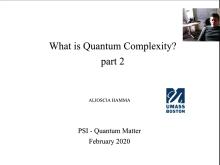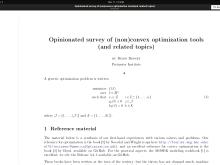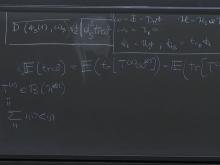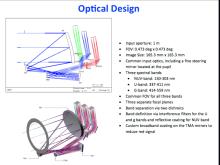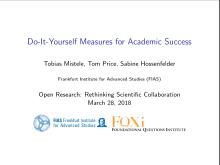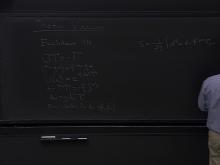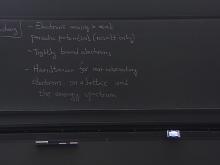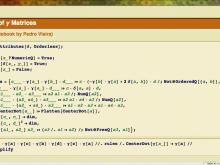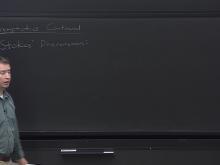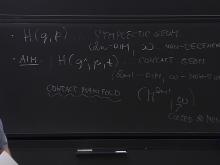Format results
-
2 talks-Collection NumberC20010
Talk
-

PSI 2019/2020 - Quantum Matter Part 2 - Lecture 1
Alioscia Hamma University of Naples Federico II
-

PSI 2019/2020 - Quantum Matter Part 2 - Lecture 2
Alioscia Hamma University of Naples Federico II
-
-
PSI 2019/2020 - Computational Physics
13 talks-Collection NumberC20007Talk
-

PSI 2019/2020 - Computational Physics - Lecture 1
Erik Schnetter Perimeter Institute for Theoretical Physics
-

PSI 2019/2020 - Computational Physics - Lecture 2
Erik Schnetter Perimeter Institute for Theoretical Physics
-

PSI 2019/2020 - Computational Physics - Lecture 3
Erik Schnetter Perimeter Institute for Theoretical Physics
-

PSI 2019/2020 - Computational Physics - Lecture 4
Erik Schnetter Perimeter Institute for Theoretical Physics
-

PSI 2019/2020 - Computational Physics - Lecture 5
Erik Schnetter Perimeter Institute for Theoretical Physics
-

PSI 2019/2020 - Computational Physics - Lecture 6
Erik Schnetter Perimeter Institute for Theoretical Physics
-

PSI 2019/2020 - Computational Physics - Lecture 7
Erik Schnetter Perimeter Institute for Theoretical Physics
-

PSI 2019/2020 - Computational Physics - Lecture 8
Erik Schnetter Perimeter Institute for Theoretical Physics
-
-
PSI 2019/2020 - Quantum Matter Part 1
18 talks-Collection NumberC20003Talk
-

PSI 2019/2020 - Quantum Matter Part 1 - Lecture 1
Alioscia Hamma University of Naples Federico II
-

PSI 2019/2020 - Quantum Matter Part 1 - Lecture 2
Alioscia Hamma University of Naples Federico II
-

PSI 2019/2020 - Quantum Matter Part 1 - Lecture 3
Alioscia Hamma University of Naples Federico II
-

PSI 2019/2020 - Quantum Matter Part 1 - Lecture 4
Alioscia Hamma University of Naples Federico II
-

PSI 2019/2020 - Quantum Matter Part 1 - Lecture 5
Alioscia Hamma University of Naples Federico II
-

PSI 2019/2020 - Quantum Matter Part 1 - Lecture 6
Alioscia Hamma University of Naples Federico II
-

PSI 2019/2020 - Quantum Matter Part 1 - Lecture 7
Alioscia Hamma University of Naples Federico II
-

PSI 2019/2020 - Quantum Matter Part 1 - Lecture 8
Alioscia Hamma University of Naples Federico II
-
-
The Cohomology of Groups (Johnson-Freyd/Guo)
11 talks-Collection NumberC19045Talk
-

The Cohomology of Groups (Johnson-Freyd/Guo) - Lecture 1
-
Meng Guo University of Illinois Urbana-Champaign
-
Theo Johnson-Freyd Dalhousie University
-
-

The Cohomology of Groups (Johnson-Freyd/Guo) - Lecture 2
-
Meng Guo University of Illinois Urbana-Champaign
-
Theo Johnson-Freyd Dalhousie University
-
-

The Cohomology of Groups (Johnson-Freyd/Guo) - Lecture 3
-
Meng Guo University of Illinois Urbana-Champaign
-
Theo Johnson-Freyd Dalhousie University
-
-

The Cohomology of Groups (Johnson-Freyd/Guo) - Lecture 4
-
Meng Guo University of Illinois Urbana-Champaign
-
Theo Johnson-Freyd Dalhousie University
-
-

The Cohomology of Groups (Johnson-Freyd/Guo) - Lecture 5
-
Meng Guo University of Illinois Urbana-Champaign
-
Theo Johnson-Freyd Dalhousie University
-
-

The Cohomology of Groups (Johnson-Freyd/Guo) - Lecture 6
-
Meng Guo University of Illinois Urbana-Champaign
-
Theo Johnson-Freyd Dalhousie University
-
-

The Cohomology of Groups (Johnson-Freyd/Guo) - Lecture 7
-
Meng Guo University of Illinois Urbana-Champaign
-
Theo Johnson-Freyd Dalhousie University
-
-

The Cohomology of Groups (Johnson-Freyd/Guo) - Lecture 8
-
Meng Guo University of Illinois Urbana-Champaign
-
Theo Johnson-Freyd Dalhousie University
-
-
-
Career Trajectories Day
2 talks-Collection NumberC18009Talk
-
PI-NRC Meeting
11 talks-Collection NumberC18011Talk
-

-

Attosecond Quantum Spectroscopy Measurement
David Villeneuve National Research Council Canada (NRC)
-

Efficient Preparation of Nontrivial Quantum States
Timothy Hsieh Perimeter Institute for Theoretical Physics
-

Time And Gravity Measurement
Pierre Dube National Research Council Canada (NRC)
-

-

Canadian Astronomy Data Center: Tools and Analytics for Large Data Sets
Sebastien Fabbro National Research Council Canada (NRC)
-

-

SI Unit Fundamental Measurements
-
Angela Gamouras National Research Council Canada (NRC)
-
Barry Wood National Research Council Canada (NRC)
PIRSA:18050045 -
-
-
Open Research: Rethinking Scientific Collaboration
11 talks-Collection NumberC18005Talk
-

-

Data Mists, Blockchain Republics, and the Moon Shot
Simon DeDeo Indiana University
-

Like penguins on an ice floe: The scary business of adopting open science practices
Benedikt Fecher Alexander von Humboldt-Stiftung
-

Collaborative Knowledge Ratchets and Fermat's Library
-
Jess Riedel NTT Research
-
Luis Batalha Fermat's Library
PIRSA:18030101 -
-

-

What’s not to like? Open science will fail unless it takes the costs seriously
Rosie Redfield University of British Columbia
-

-

-
-
PSI 2016/2017 - Quantum Field Theory III (Gomis)
15 talks-Collection NumberC17004Talk
-

PSI 2016/2017 - Quantum Field Theory III - Lecture 1
Jaume Gomis Perimeter Institute for Theoretical Physics
-

PSI 2016/2017 - Quantum Field Theory III - Lecture 2
Jaume Gomis Perimeter Institute for Theoretical Physics
-

PSI 2016/2017 - Quantum Field Theory III - Lecture 3
Jaume Gomis Perimeter Institute for Theoretical Physics
-

PSI 2016/2017 - Quantum Field Theory III - Lecture 4
Jaume Gomis Perimeter Institute for Theoretical Physics
-

PSI 2016/2017 - Quantum Field Theory III - Lecture 5
Jaume Gomis Perimeter Institute for Theoretical Physics
-

PSI 2016/2017 - Quantum Field Theory III - Lecture 6
Jaume Gomis Perimeter Institute for Theoretical Physics
-

PSI 2016/2017 - Quantum Field Theory III - Lecture 7
Jaume Gomis Perimeter Institute for Theoretical Physics
-

PSI 2016/2017 - Quantum Field Theory III - Lecture 8
Jaume Gomis Perimeter Institute for Theoretical Physics
-
-
PSI 2016/2017 - Condensed Matter (Dalidovich)
5 talks-Collection NumberC16026Talk
-
PSI 2016/2017 - Mathematica (Schnetter)
4 talks-Collection NumberC16025Talk
-

PSI 2016/2017 - Mathematica - Lecture 1
Erik Schnetter Perimeter Institute for Theoretical Physics
-

-

PSI 2016/2017 - Mathematica - Lecture 3
Erik Schnetter Perimeter Institute for Theoretical Physics
PIRSA:16090039 -

PSI 2016/2017 - Mathematica - Lecture 4
Erik Schnetter Perimeter Institute for Theoretical Physics
PIRSA:16090040
-
-
PSI 2016/2017 - Functions, "Functions", etc. (Wohns)
7 talks-Collection NumberC16023Talk
-

PSI 2016/2017 - Functions, "Functions", etc. - Lecture 1
Dan Wohns Perimeter Institute for Theoretical Physics
-

-

-

-

-

-

-
-
PSI 2016/2017 - Classical Mechanics (Kubiznak)
7 talks-Collection NumberC16021Talk
-

PSI 2016/2017 - Classical Mechanics - Lecture 1
David Kubiznak Charles University
-

-

-

-

-

-

-
-
PSI 2019/2020 - Quantum Matter (Part 2)
2 talks-Collection NumberC20010PSI 2019/2020 - Quantum Matter (Part 2) -
PSI 2019/2020 - Computational Physics
13 talks-Collection NumberC20007PSI 2019/2020 - Computational Physics -
PSI 2019/2020 - Quantum Matter Part 1
18 talks-Collection NumberC20003PSI 2019/2020 - Quantum Matter Part 1 -
The Cohomology of Groups (Johnson-Freyd/Guo)
11 talks-Collection NumberC19045The Cohomology of Groups (Johnson-Freyd/Guo) -
Career Trajectories Day
2 talks-Collection NumberC18009What can you do with a Physics degree? Plenty although the reality is that most people being trained in physics at the undergraduate graduate or even postdoctoral levels aren't aware of the broad spectrum of opportunities available to them. The problem solving skills necessary to succeed in physics are sought after in a wide range of technology financial and industrial sectors. This day will bring together current students and postdocs in theoretical physics with former students who have found great success in a wide range of different areas from startups to big companies finance and even bestselling novels. Many of them were affiliated with Perimeter Institute and chose their career paths over opportunities in academia. Through a combination of talks and panel sessions this day will showcase the many career possibilities available to young physicists steps they can take to explore these options and how to avoid the inevitable pitfalls. Lunch will be provided and there will ample opportunities to ask questions and network.
-
PI-NRC Meeting
11 talks-Collection NumberC18011 -
Open Research: Rethinking Scientific Collaboration
11 talks-Collection NumberC18005Scientific inquiry in the 21st century is beset with inefficiencies: a flood of papers not read theories not tested and experiments not repeated; a narrow research agenda driven by a handful of high-impact journals; a publishing industry that turns public funding into private profit; the exclusion of many scientists particularly in developing countries from cutting-edge research; and countless projects that are not completed for lack of skilled collaborators. These are all symptoms of a major communication bottleneck within the scientific community; the channels we rely on to share our ideas and findings especially peer-reviewed journal articles and conference proceedings are inadequate to the scale and scope of modern science. The practice of open research doing science on a public platform that facilitates collaboration feedback and the spread of ideas addresses these concerns. Open-source science lowers barriers to entry catalyzing new discoveries. It fosters the real-time sharing of ideas across the globe favoring cooperative endeavor and complementarity of thought rather than wasteful competition. It reduces the influence of publishing monopolies enabling a new credit attribution model based on contributions made rather than references accrued. Overall it democratizes science while creating a new standard of prestige: quality of work instead of quantity of output. This workshop will bring together a diverse group of researchers from fields as diverse as physics biology computer science and sociology committed to open-source science. Together we will review the lessons learnt from various pioneering initiatives such as the Polymath project and Data for Democracy. We will discuss the opportunity to build a new tool similar to the software development platform GitHub to enable online collaborative science. We will consider the challenges associated with the adoption of such a tool by our peers and discuss ways to overcome them. Finally we will sketch a roadmap for the actual development of that tool.
-
PSI 2016/2017 - Quantum Field Theory III (Gomis)
15 talks-Collection NumberC17004PSI 2016/2017 - Quantum Field Theory III (Gomis) -
PSI 2016/2017 - Condensed Matter (Dalidovich)
5 talks-Collection NumberC16026PSI 2016/2017 - Condensed Matter (Dalidovich) -
PSI 2016/2017 - Mathematica (Schnetter)
4 talks-Collection NumberC16025PSI 2016/2017 - Mathematica (Schnetter) -
PSI 2016/2017 - Functions, "Functions", etc. (Wohns)
7 talks-Collection NumberC16023PSI 2016/2017 - Functions, "Functions", etc. (Wohns) -
PSI 2016/2017 - Classical Mechanics (Kubiznak)
7 talks-Collection NumberC16021PSI 2016/2017 - Classical Mechanics (Kubiznak)
